McCarthy sends GOP negotiators to White House 8 days before potential default
After three weeks of negotiations and eight days from a possible default, as of Wednesday there was still no breakthrough in talks to avert potential financial catastrophe as soon as June 1.
Shortly before noon, House Speaker Kevin McCarthy told reporters he was sending his House Republican bargaining team to the White House "to try to finish out negotiations."
"There’s a number of places that we are still far apart," he said. "I mean, it didn’t seem like it’d be this hard."
Lead GOP negotiator Rep. Patrick McHenry of North Carolina said he was "hopeful that we can get this resolved" as he left the Capitol, a notable shift from Tuesday night when he was clearly more frustrated. But he and his fellow negotiator Garrett Graves of Louisiana acknowledged there's little time left.

The Republican team was seen leaving the White House after about fours and made no comment.
The House is set to leave Washington Thursday for a week-long Memorial Day recess, although members have been warned they could be called back.
"Look, you can start counting the days and there's no question, we're getting to crunch time," said another GOP negotiator, Graves said. "We've been trying to look at things differently, trying to come up with new ideas. We recognize the urgency here, but we also recognize the House with a solid package on the table that saves funds."
Earlier, as McCarthy made his way into the Capitol, ABC News Senior Congressional Correspondent Rachel Scott asked him where things stand.
"I still feel they're productive -- the talks," he said, but there were no signs the talk were any closer to a deal.
In fact, McCarthy said he has not spoken to President Joe Biden since Monday.
Both sides appeared to be waiting for the other to blink.
"I'm hopeful that they come back that they realize what the American public is telling them as well, that you cannot have the highest percentage of debt and spend the most amount of money while you're getting the most amount of revenue in, that you got to change that behavior, just like you would do in any household," McCarthy said. "And I'm hopeful as they come, if they come back today that they realize that."

As the standoff over federal spending continued, the White House has offered to freeze spending while Republicans are demanding deep cuts, according to a source familiar with the discussions. McCarthy is "beholden" to MAGA extremists, the source said.
"Well, the point you have to make, here we are eight days away. Why are we here? The Democrats do not want to come off their spending addiction," McCarthy said.
Asked how much in federal spending Republicans want to cut, he said, "Well, that's part of negotiation. Democrats don't even want to spend less, they want to spend more, that's unreasonable," he said.
He again made it clear increasing tax revenue is not on the table.
"Find ways to eliminate the waste. And that's what we've been doing. That's why on February 1, I sat with the president. That's exactly what I said to him. We can't raise taxes, and what's he talking about now? We need to raise more because I want to spend more after you've already done that, you set all the records you want to set, once the Democrats took the majority, this is what they brought us. And in doing so they brought us inflation, hurting every family," he said.

The frustration among some Democrats was palpable as over 20 members of the House Progressive Caucus voiced their concerns Wednesday over the debt ceiling negotiations.
"We will not let Speaker McCarthy burn the House to the ground and then try to get away with blaming the firefighters," Caucus Whip Rep. Greg Casar said. "I will be clear, working families will not be taken hostage. Progressives will continue standing strong and we will do everything we can to hold them accountable."
With time running short, caucus members are standing firm members in saying they will not support a deal that has stricter work requirements for some Americans getting government aid.
"Our overwhelming majority of Progressive Caucus members -- of 102 members -- answered that question already and said that is unacceptable," chair Rep. Pramila Jayapal, D-Wash., told ABC's Scott.
"We have continued to make our position clear to the White House and I think you've seen that they've heard us and they've made a number of statements," she said.
"The bottom line is we just don't share their values," Rep. Jim McGovern of Massachusetts said of House Republicans. "And you know, and I have to tell you, if we're not about defending the most vulnerable in this country, and helping to uplift them, then I don't know what the hell we're here for."
Both Biden and McCarthy will need some House Democrats to help pass any deal.
Treasury Secretary Janet Yellen on Wednesday tripled down on her warnings that June 1 might be the day the U.S. could default on its debt, even, she said, if it's "hard to be precise" about what happens around that date.
Yellen, speaking at a Wall Street Journal forum, was reluctant to discuss a "day-after" scenario in the wake of a U.S. default but allowed that Treasury would have to be ready to prioritize some bills over others.
She said payment prioritization is "not operationally feasible" -- emphasizing how unprecedented a default would be.
ABC News' Lauren Peller, Justin Gomez and Chris Boccia contributed to this report.




